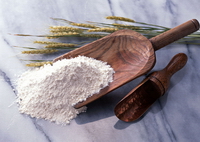
Food Safety Focus (30th Issue, January 2009) – Food Incident Highlight
Benzoyl Peroxide in Flour
Recently, there had been some debates on the use of benzoyl peroxide as a food additive in Mainland China , where there were some differing opinions on its use in flour. Some argued that by allowing its use in flour, it opens the gate to abuses as some manufacturers may add excessive amount. They also argued that the use of benzoyl peroxide is unnecessary and it is not being used in flour in the European Union. On the other hand, some argued that many countries allow the use of this additive in flour and that the level allowed in Mainland China is quite conservative.
Benzoyl peroxide is a food additive that can be used as a flour treatment agent. It oxidizes the naturally-occurring carotenoids in flour, which gives untreated flour a yellowish tint, and whitens the flour as a result. It is often used as some consumers prefer white flour to yellowish ones. When the flour is made into food, most of the benzoyl peroxide is converted to benzoic acid, a commonly-used preservative. The benzoic acid ingested will be excreted in the urine afterwards.
According to International Agency for Research on Cancer, benzoyl peroxide is not classified as a carcinogen. The Joint FAO/WHO Expert committee on Food Additives (JECFA) had evaluated benzoyl peroxide and concluded that the intake of benzoyl peroxide should be considered with other sources of dietary intake of benzoic acid. JECFA also concluded that benzoic acid is of low acute and chronic toxicity and the Codex Alimentarius Commission (Codex) has allowed its use in many food types.
Internationally, benzoyl peroxide is permitted to be used in flour or other food products by many authorities, including Codex, Mainland China , USA , Canada , Australia , New Zealand etc. CFS considers that benzoyl peroxide can be safely applied to flour if it is used following Codex's standard.
Manufacturers and importers of flour should ensure that the flours are safe for human consumption and the relevant regulations are followed.
Illustration: Benzoyl peroxide can whiten flour which is preferred by some consumers 

